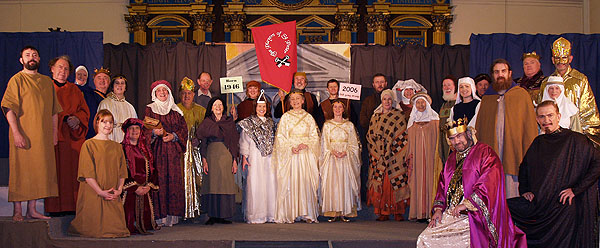
The Company of the Special 60th Anniversary Production, from left: standing – Peter Evans, Bernard Lawrence, Laura Barber, Allan Yeoman, Megan Thompson, Olive Stubbs, Tom Holmes, Ken MacLeod, Jo Sanders, Sue Chapman, Maggie Robson, Peggy Forsyth, Edward Weedon, Alan York, Helen Rendall, Andrew Pink, Janet Cowen, Judith Elbourne, Irene Deeks, Dennis Erdwin, Jo Greene, David Coster, Roger Haworth, Andrew Dobson, Eve Haughton, Oliver Clement; kneeling – Danielle Gillett, Deborah Pollard; seated – Mike Waring, Felix Pring; also – Jamie Moreno, Patricia Reader, Jeff Bannister, Angela Bird, Michael Smith, Simon Reynolds
What we do
Around the beginning of December each year (technically, the first week of Advent), we perform a selection of short plays, by turns from the four most complete cycles (York, Chester, Wakefield and "N-Towne" – also known as "The Plaie called Corpus Christi"), as well as the occasional fragmentary survivor from other, lost cycles. These plays tell Bible stories ranging from creation to the Nativity and beyond, as seen through medieval eyes.
At the heart of the group is a core of solid scholarship which, along with decades of collective experience and insight, enables us to adhere as faithfully as we can judge it to the original production style, capturing something of the early spirit and intent.
Although we use electric lighting and the church's organ, the props are low-tech and the dialogue very much as it was five hundred years ago, following the original texts and adapted only for length and to clarify some of the more obscure language for present-day audiences.
Taking part
Currently we have about 80 members, not all of them actively involved every year of course, but we are always glad of new talent, so if you think you might like to become involved in any way at all – on stage, backstage, singing, front of house, helping with costumes, or any of the myriad jobs necessary for any show – we can promise you a warm, friendly welcome.
Although our material is based on the Bible and we perform in a church, the emphasis is dramatic and historical rather than theological. That said, we do try to remain true to the spirit of the originals, which were religious in intent and liturgical in derivation, and of course we accord due reverence to our surroundings.
Still, we have plenty to offer people who are not especially concerned with the religious aspects, but may be interested in, for example, the language or the medieval history – or the stage-down party. Above all, we enjoy ourselves!
So if you are interested, do get in touch (details on the Contacts page). Or simply keep an eye on this website for details of the next production and come along to the auditions in (usually) September.
Membership is free for the first year, and £10 annually thereafter.
The Players:
Children of the Peace
For 78 years, the Players of St Peter have been performing English medieval drama in London, and are, we believe, unique in offering annual productions from the main English mystery cycles.

The Company of the Special 60th Anniversary Production, from left: standing – Peter Evans, Bernard Lawrence, Laura Barber, Allan Yeoman, Megan Thompson, Olive Stubbs, Tom Holmes, Ken MacLeod, Jo Sanders, Sue Chapman, Maggie Robson, Peggy Forsyth, Edward Weedon, Alan York, Helen Rendall, Andrew Pink, Janet Cowen, Judith Elbourne, Irene Deeks, Dennis Erdwin, Jo Greene, David Coster, Roger W. Haworth, Andrew Dobson, Eve Haughton, Oliver Clement; kneeling – Danielle Gillett, Deborah Pollard; seated – Mike Waring, Felix Pring; also – Jamie Moreno, Patricia Reader, Jeff Bannister, Angela Bird, Michael Smith, Simon Reynolds
What we do
Around the beginning of December each year (technically, the first week of Advent), we perform a selection of short plays, by turns from the four most complete cycles (York, Chester, Wakefield and "N-Towne" – also known as "The Plaie called Corpus Christi"), as well as the occasional fragmentary survivor from other, lost cycles. These plays tell Bible stories ranging from creation to the Nativity and beyond, as seen through medieval eyes.
At the heart of the group is a core of solid scholarship which, along with decades of collective experience and insight, enables us to adhere as faithfully as we can judge it to the original production style, capturing something of the early spirit and intent.
Although we use electric lighting and the church's organ, the props are low-tech and the dialogue very much as it was five hundred years ago, following the original texts and adapted only for length and to clarify some of the more obscure language for present-day audiences.
Taking part
Currently we have about 80 members, not all of them actively involved every year of course, but we are always glad of new talent, so if you think you might like to become involved in any way at all – on stage, backstage, singing, front of house, helping with costumes, or any of the myriad jobs necessary for any show – we can promise you a warm, friendly welcome.
Although our material is based on the Bible and we perform in a church, the emphasis is dramatic and historical rather than theological. That said, we do try to remain true to the spirit of the originals, which were religious in intent and liturgical in derivation, and of course we accord due reverence to our surroundings.
Still, we have plenty to offer people who are not especially concerned with the religious aspects, but may be interested in, for example, the language or the medieval history – or the stage-down party. Above all, we enjoy ourselves!
So if you are interested, do get in touch (details on the Contacts page). Or simply keep an eye on this website for details of the next production and come along to the auditions in (usually) September.
Membership is free for the first year, and £10 annually thereafter.
The group was started in 1946 by a group of men and women in the City of London who had decided to perform a religious play both as a thanksgiving for the return of peace after the Second World War and as a celebration of Christmas. Since 1951 the production has been taken from one of the medieval mystery cycles.
Over the years there have of course been many changes of actors and actresses, around an ongoing "core" of members who maintain the continuity and pass their knowledge on to those who form the nucleus for the succeeding generation.
The Players have had the benefit of the talents of many people from many walks of life, including professionals from the theatrical, musical and creative worlds – expertise that has helped to strengthen the group as a whole. Always the aim has been to give the best possible production; to make it as accessible as possible to a modern audience; and to keep faith with the original works as they were devised more than 500 years ago.
There have been few changes of director, and the second, "Jock" Longstaff, was responsible for most of the productions in our first 25 years. Up to his death in 1995 he attended performances as often as his health allowed and was happy to see that the Players were still keeping the original tradition alive, in new ways. Olive Stubbs, our current director has so far created 38 productions, following a number of years as a performer (in which capacity she can still be seen in most years).
The group's first home was the church of St Peter-upon-Cornhill, but in 1988 a change of use meant we had to find another venue, and after much serious searching we found and were made welcome at Holy Trinity Church, Sloane Street, SW1, where we spent ten happy years. Then once again, changes in the church made it necessary for us to move on. And yet again, there was serious investigation of possible church venues, with a preference for the City of London, and we were invited to perform at St Clement Eastcheap.
Unfortunately, in 2012 the cycle repeated itself; changes in the operating of the building meant that we were once again looking for a new home, a search that brought us to our current venue, St George-in-the-East, a Hawksmoor church in Shadwell.
One of the major differences between the various churches has been size – St Peter-upon-Cornhill is a small Wren church, built following the Great Fire of London. Holy Trinity was built at the end of the 19th century and it is large enough to be known as the Cathedral of the Arts and Crafts Movement. The Players' backstage area alone was not much smaller than the whole of St Peter's!
At St Clement, which is another Wren church, we were once again pressed for space, and concentrated the production into an historic area approximately the size of the original stage area of the plays in medieval times. St George-in-the-East, by contrast, offers more elbow room, although the disposition of the church lights creates a different set of constraints.
All this has helped to make the performances very varied over the years. We aim continually to discover new aspects, new insights and new ways of translating and presenting the medieval scenes to a modern audience.
We take pride in continuing to offer an entertainment that existed before Shakespeare but largely died out with the Reformation and has only come back into performance within the past century. The play texts that have survived lead us to wonder about the many texts lost from all over the country – for instance, of the London plays nothing survives.





